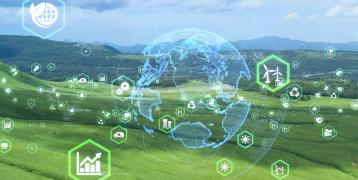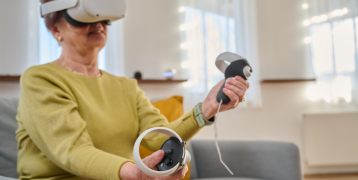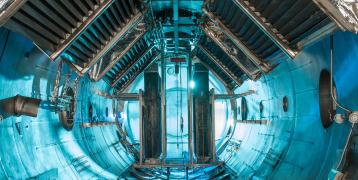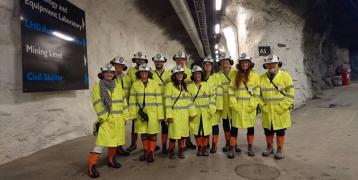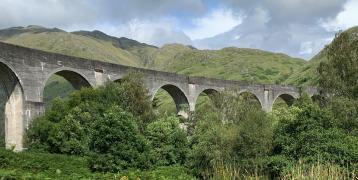Leading industrial transition: key learnings
On 6 and 7 November 2024, the Policy Learning Platform organized a two-day event in Bilbao, Spain, bringing together public authorities and Interreg Europe project partners to discuss Europe’s journey toward industrial transformation.
What were the workshops about?
Members of the Interreg Europe community convened in Bilbao to exchange insights and experiences on advancing industrial transition at the regional level. The discussions focused on fostering a more digital, green, and resilient economy.
The 2 events featured thematic working sessions addressing key aspects of industrial transformation: research valorisation, regional transformation processes, sector-specific transitions, and fostering the growth of innovative businesses in future-oriented industries. Each session included presentations of good practices to showcase effective approaches, followed by interactive workshops where participants shared their local challenges and experiences.
To learn more about this topic, explore the conclusions report our experts have prepared for you.
It contains insights related to the industrial transition, as well as inspiring Interreg Europe good practices and policy recommendations.
Featured projects
Featured good practices
Discover the good practices from Interreg Europe projects that we explored during the workshop.
Policies for the industrial transition
With a strong focus on R&D&I, the Basque Government has implemented a comprehensive Industrial Policy since 1981, positioning the region as a leader in industrial transformation. The Basque Country stands out as a high-innovation region, excelling in various key areas that drive its economic and social progress. The presentation outlines a structured approach to governance, including the launch and development of pilot projects, evaluation of value chains, and prioritization of technological solutions to reduce CO2 emissions.
The presentation outlines the city’s evolution from an industrial hub to a leader in sustainable innovation. Today, Duisburg is transforming through sustainable projects, positioning itself as a European hydrogen technology center and establishing initiatives like Hy.Region.Rhein.Ruhr, a network of over 50 members focused on hydrogen innovation. Projects like Circular Rhein.Ruhr and the upcoming DU.circular emphasize circular economy practices in metals, logistics, and construction.
The presentation focused on the ‘shared value’ concept promoted by ACC’IO (Catalonia, Spain) to engage regional clusters in industrial transformation processes combining economic and social impact. The program’s structured methodology includes training, research, and best practice exchanges, with special focus on social and environmental impact. This work impacts over 800 companies and involves collaboration with a range of stakeholders, including private companies, funding bodies, and public administration.
The STF programme in Finland provides a comprehensive toolkit and structured pathway for sustainable tourism development. Through its 7-step development path and adherence to international standards, STF guides businesses towards sustainability and ensures ongoing commitment through regular review processes. The programme’s focus on education and competence-building, facilitated by Visit Finland Academy and sustainability consultants, further enhances its value by empowering stakeholders with the necessary knowledge and skills to effectively implement sustainable measures. The programme also grants a sustainability label for tourism businesses and destination.
The presentation provides a comprehensive overview of the policies aimed at developing a knowledge-intensive economy in San Sebastian. The strategic lines for Fomento San Sebastian from 2023 to 2027 are outlined, focusing on promoting innovative projects, fostering municipal public innovation, and positioning the city as a hub for entrepreneurship and science. The means involve accelerating innovative projects, promoting technology transfer, and supporting the growth of new sectors such as AI and biotechnology. The presentation also details the EKIN program, which aims to support advanced innovation and entrepreneurship in San Sebastian.
The presentation discusses efforts to foster a regional aerospace ecosystem in the Netherlands, with a focus on sustainability, digital transformation, and business growth. This ecosystem-building effort emphasizes co-creation spaces, known as field labs, where partners work together on practical innovation. Through shared infrastructure and collaborative projects, these field labs accelerate innovation by allowing knowledge institutes, corporations, SMEs, and startups to jointly develop and test solutions. Overall, the project aspires to create a resilient aerospace sector by leveraging regional collaboration, shared resources, and a focus on sustainable and digital advancements.
Research valorisation
The Research Valorisation Programme 2.0 (RVP 2.0) represents a collaborative effort between the North-East Regional Development Agency (RDA) and the World Bank, with the goal of facilitating the commercialisation of research outputs from public research organisations (PROs). This intensive 10-month program, conducted in English, serves as a platform for mentoring, capacity-building, and fostering interaction between PROs and industry stakeholders. It provides invaluable support in knowledge exchange, focusing on areas such as marketing strategy, intellectual property rights (IPRs), and commercialisation strategy. Through RVP 2.0, participating research teams have the opportunity to elevate the technological and market readiness of their projects, pinpoint potential markets, and deepen their understanding of IPRs.
This good practice involves proactive scouting of innovative research findings within university labs through two main actions: weekly permanencies and educational events organised by business and detection officers from SATT Conectus, the regional TTO from Alsace, France. These officers aim to integrate into lab teams, fostering trust and facilitating faster tech transfer. Researchers benefit from ongoing support and educational opportunities, while Conectus efficiently identifies transferable research results. Evidence shows that this approach has led to successful tech transfer projects. Key lessons include the importance of trust, flexibility, integration with academic activities, and political support.
The Deeptech Entrepreneurship initiative is a short course offered at the University of Strasbourg, targeting PhD candidates, researchers, and aspiring entrepreneurs to promote the creation of Deeptech spin-offs or start-ups. Half of the participants are PhD candidates involved in the “MatureYourPhD” tech transfer project. The course covers topics such as strategy, business models, intellectual property, financing, and human resources, using innovative methods like hackathons, interactive workshops, and project-based learning. Offered as a Master’s or lifelong learning course, it is co-designed by Pépite ETENA, the QuestForChange regional incubator, and SATT Conectus Alsace. With an annual budget of €12,000, the programme has trained 12 participants, six of whom are leading the creation of five new spin-offs.
The program TECNIOspring is a mobility scheme to attract international researchers to develop R&D projects in Catalonia. The programme provides 100% financial support to offer fellows 2-year employment contracts to develop applied research projects with focus on technology transfer. TECNIOspring is an example of a technology push initiative that gives financial incentives for private companies to conduct and to invest in R&D. In addition to incentivise private companies, the programme allows for extra-regional knowledge flows and linkages with other R&D centres.

